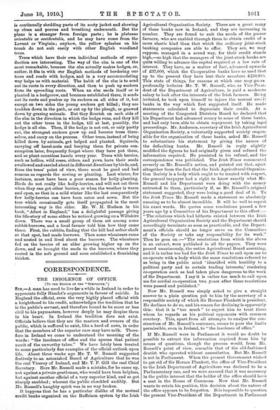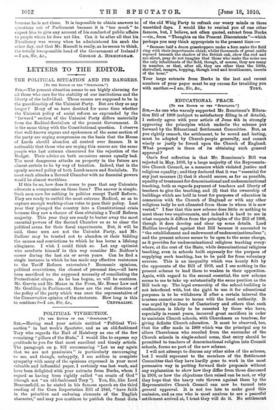CORRESPONDENCE.
THE INSOLENCE OF OFFICE.
[To THE EDITOZ OF THE " SPICTALTOZ.1
Sis,—A man has need to live for a while in- Ireland in order to appreciate fully Hamlet's arguments in favour of suicide. In England the official, even the very highly placed official with a knighthood to his credit, acknowledges the tradition that he is the public's servant, and therefore bound to be more or less civil to his paymasters, however deeply he may despise them in his heart. In Ireland the tradition does not exist. Officials believe that they are the masters and owners of the public, which is suffered to exist, like a herd of cows, in order that the members of the superior race may have milk. There- fore in Ireland we come to understand the meaning of the words : "the insolence of office and the spurns that patient merit of the unworthy takes." We have lately been treated to some particularly fine examples of the official outlook upon life. About three weeks ago Mr. T. W. Russell suggested festively to an astonished Board of Agriculture that he was the real Viceroy of Ireland, and Mr. T. P. Gill the real Chief Secretary. Here Mr. Russell made a mistake, for he came up, not against a private gentleman, who would have been helpless, but against another official of a very superior kind, and so got sharply snubbed ; whereat the public chuckled audibly. But Mr. Russell's haughty spirit was in no way broken.
It happens that he has a particular dislike of the mutual credit banks organised on the Raffeison system by the Irish
Agricultural Organisation Society. There are a great many of these banks now in Ireland, and they are increasing in number. They are found to suit the needs of the poorer farmers, who are enabled through them to obtain credit of a more elastic kind than that which the ordinary joint-stock banking companies are able to offer. They are, we may suppose, managed in a sound way, for their credit stands high,—so high that the managers of the joint-stock banks are quite willing to advance the capital required at a low rate of interest. They have, as a matter of fact, advanced upwards of £37,000, which the Co-operative banks have so used that up to the present they have lent their members 2250,001 This state of things, for reasons at which one may guess profoundly irritates Mr. T. W. Russell, who, as Vice-Presi- dent of the Department of Agriculture, is paid a moderate salary to look after the interests of the Irish farmers. Being irritated, he took upon himself to injure the mutual creili•.; banks in the way which first suggested itself. He made statements calculated to depreciate their credit. At a meeting of the Congested Districts Board he declared that his Department had advanced money to some of these banks, and had only been able to obtain repayment by taking legal proceedings. Mr. Anderson, secretary of the Irish Agricultural Organisation Society, a voluntarily supported society respon- sible for the organisation of these banks, asked Mr. Russell to substantiate his statement by giving the names of the defaulting banks. Mr. Russell in reply slightly modified the figures he had originally given and refused the information required. He persisted in his refusal, and the correspondence was published. The Irish Times commented severely on Mr. Russell's action, and pointed out that, apart altogether from the fact that the Irish Agricultural Organisa- tion [society is a body which ought to be treated with respect, the general taxpayer had a right to know exactly what Mr. Russell and his Department were doing with the money entrusted to them, particularly if, as Mr. Russell's original statement suggested, they were losing a good deal of it. To the Irish Times Mr. Russell made a statement so absolutely amazing as to be almost incredible. It will be well to repeat his exact words. He quotes some resolutions passed a few years ago by a Committee of his Department to this effect :— " The relations which had hitherto existed between the Irish Agricultural Organisation Society and the Department should accordingly terminate as soon as practicable, and the Depart- ment's officials should no longer serve on the Committee of the Society or take any responsibility for its work." Then he goes on :—" The resolutions from which the above is an extract, were pnblished in all the papers. They were passed unanimously, the entire Agricultural Board assenting, and it is rather too bad for the Irish Times to call upon me to co-operate with a body which the same resolutions referred to as being in the public mind identified with hostility to a political party and to certain trading interests,' rendering co-operation such as had taken place dangerous to the work of the Department. I say it is rather too much to call upon me for cordial co-operation two years after these resolutions were passed and published."
Now Mr. Russell was simply asked to give a straight answer to a plain question put to him by the secretary of a. responsible society of which Sir Horace Plunkett is president. He declines to do so, and his reason for declining is apparently this : that it is " too much " to expect him to treat those whom be regards as his political opponents with common courtesy. This, apart from all attempts to analyse the con- struction of Mr. Russell's sentences, seems to pass the limits permissible, even in Ireland, to "the insolence of office."
If Mr. Russell were in Parliament it would no doubt be possible to extract the information required from him by means of questions, though the process would, from Mr. Russell's point of view, resemble that of the old-fashioned dentist who operated without anaesthetics. But Mr. Russell is not in Parliament. When the present Government wished to get rid of Sir Horace Plunkett, the office of Vice-President to the Irish Department of Agriculture was declared to be a Parliamentary one, and we were assured that it was necessary in the public interest that the holder of the office should have a seat in the House of Commons. Now that Mr. Russell wants to retain his position, this decision about the nature of the office appears to be forgotten. It is impossible to question the present Vice-President of the Department in Parliament
because he is not there. It is impossible to obtain answers to questions out of Parliament because it is "too much" to expect hiui to give any account of his conduct of public affairs to people whom he does not like. Can it be after all that his Excellency was wrong when he administered his snub the other day, and that Mr. Russell is really, as he seems to think, the totally irresponsible head of the Government of Ireland P











































 Previous page
Previous page